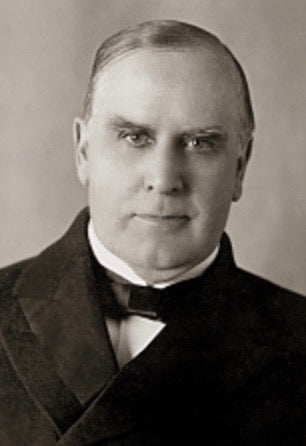
McKinley's Lasting Legacy
Share
McKinley’s Legacy
Bold
William McKinley, known for wearing a red carnation in his lapel as a symbol of good luck, left an enduring mark on American history. This article explores his accomplishments before and during his presidency, highlighting his economic policies and leadership. McKinley’s legacy is one of prosperity, strength, and forward-thinking governance.
As a congressman, McKinley was a strong advocate for tariffs to protect American industries and workers. His McKinley Tariff Act of 1890 significantly raised duties on imports, fostering domestic growth and industrial expansion. He also championed the Gold Standard, believing it provided economic stability and confidence in U.S. currency.
During his tenure as governor of Ohio, McKinley supported labor rights and encouraged workers to join unions. He opposed employers who denied their workers the right to organize, advocating for fair wages and improved working conditions. His leadership in Ohio demonstrated his commitment to economic fairness and prosperity.

Prosperous
McKinley’s election as President in 1896 ushered in an era of economic growth and international influence. The Dingley Tariff of 1897 reinforced protective tariffs, boosting American manufacturing and employment. His support for the Gold Standard Act of 1900 ensured monetary stability and strengthened the nation’s financial system.
Under McKinley’s leadership, the Spanish-American War led to a swift U.S. victory and global recognition. The Treaty of Paris in 1898 resulted in the acquisition of Puerto Rico, Guam, and the Philippines, expanding America’s influence. These territorial gains marked the beginning of the United States as a world power.
McKinley’s foreign policy also emphasized open markets and strategic partnerships. His Open Door Policy promoted fair trade with China while maintaining its territorial integrity. Additionally, the Hay-Pauncefote Treaty paved the way for the construction of the Panama Canal, securing America’s role in global trade.

Enduring
McKinley’s successful re-election in 1900 reflected national confidence in his leadership. Economic prosperity and diplomatic strength reassured voters that the country was on the right path. His presidency was defined by stability, industrial progress, and an expanding global presence.
Tragically, McKinley was assassinated in 1901, cutting short his second term. His final request was for the care of his beloved wife, Ida, demonstrating his deep devotion to her. His legacy remains one of economic strength, visionary leadership, and unwavering dedication to the nation.
Ride the Wave
At WaveRocket, we celebrate bold leadership, American pride, and a winning mindset through our high-quality apparel. Explore more thought-provoking articles on history, politics, and culture at WaveRocket posts.
by Roger Culpepper
